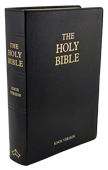The Holy Bible – Knox Translation
The Prophecy of Ezechiel
|
Chapter 24
|
1
And so the ninth year came, and the tenth month, and the tenth day of it. And the Lord gave me this message:
2
Son of man, write down this day as The Day Itself.✻ This day, this very day, the king of Babylon has closed his grip on Jerusalem.
3
A riddle, a parable, for the rebellious brood! Tell them the Lord God this bidding gave thee: Set a pot on the fire, but filling it first with water;
4
slice after slice goes in, all that is best; thigh and shoulder, the best joints of all, to fill the pot;
5
and fat be the sheep that yields them. Pile high the fuel✻ beneath; now boil pot, and see the stew, there in the heart of it!
6
But ah, says the Lord God, what of the city that is stained with blood? It is no better than a pot covered with rust, that cannot be scraped off any longer; broken in pieces that must be cast away one by one; never shall the lot fall upon it.✻
7
Blood plain for all to see, spilt on the polished rock, not on earth that might hide it away under the dust;
8
rock, not earth, so I would have it; blood unconcealed, to warrant my angry frown, my avenging punishments!
9
Out upon the blood-stained city, says the Lord God, the great pyre I mean to kindle!
10
Pile high the fuel for its burning! Why, how is this, meat wasted, the whole dish charred, the very bones calcined?
11
Empty of water it must be set on the coals, till it is red-hot, and copper melts away, and the stain on it is burnt out, and it is rusty no more!
12
Alas, it is but labour spent in vain; so deep is that rust, even the fire will not drive it out.✻
13
A curse lies on this uncleanness of thine; purge thee I would, yet purged thou wilt never be, never till I have taken full toll of my vengeance on thee.
14
Such is my divine doom; come it must, executed it needs must be; indulgence is none, nor mercy, nor pity; I will pay thee what thy ill life, thy ill thoughts have earned.
15
The Lord’s word came to me,
16
Son of man, I mean to smite thee down, by taking away from thee what thou most lovest. Dole make thou none, nor lament, shed never a tear.
17
Unmarked be thy sighing, with no funeral grief made; thy head covered, thy feet shod, no veil on thy face, no customary fare of mourners.
18
And so it was; that morning I uttered my word to the people, and my wife died at set of sun. Next day, I did as the Lord bade me,
19
and the people were all agog to know the meaning of what I did.
20
Why, I told them, the Lord has spoken to me,
21
giving me a message for the race of Israel: he means to profane his own sanctuary, that proud boast of yours, which you love so, trembling ever for its safety. Sons and daughters of yours, left behind at Jerusalem, will die at the sword’s point.
22
As I do now, you will do then; no veils on your faces, no customary fare of mourners;
23
heads covered, feet shod, you will make neither dole nor lament, but languish ever under the load of your guilt, sighing each of you in his neighbour’s ear.✻
24
In Ezechiel, says the Lord God, read your own doom; when that day comes, you will be at pains to do as he does now; you will have learned what power the Lord God has.
25
Yes, son of man, the day is coming when I will rob them of that citadel of theirs, that proud boast of theirs, so well loved, the comfort of their thoughts; rob them, too, of sons and daughters.
26
And what of thyself? Wait till a fugitive comes and tells thee the news;✻
27
then, when he utters his message, utter thou thine, dumb no longer. So thou shalt be the presage of their doom, and they shall learn my power at last.


